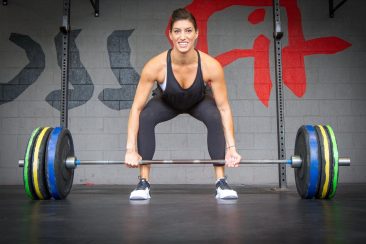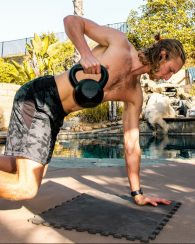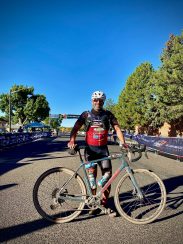Welcome back to another live chat with Graham on Instagram. This week's guest is Paralympic hopeful Josie Fouts who is a para-cyclist shooting for the stars by competing at the elite level on the bike for team USA. Read on to learn more about this incredible athlete and woman.

G: Josie lets just start with your backstory. Where are you from?
J: So I grew up in Toledo, Ohio where I did my undergrad in Nutrition then I moved to Colorado, loveee the outdoors, and conveniently I was by one of the best research schools; Colorado State University so I got my Masters in Nutrition and Immunology. This is where I was introduced to microbiomes!
G: So cool that you went there, great research school. So what was your main focus with choosing this major and what were you trying to do with your career?
J: I was looking specifically at the gut. We have these little immune packets, that aren't necessarily lymph nodes but basically like that, that are in our gut where 70% of our immune system resides and nobody really knows about them. So my job as a master's student was to characterize the types of immune cells that were there. In a controlled model but also an obesity model as well.
G: Cool so definitely related to fitness and health. Also, really for anyone, endurance sports junky or the average Joe. Making people feel better, healthier...right?
J: Exactly.
G: Good stuff. That's awesome how that ties into what you're doing now. So SPOILER ALERT, she's a Paralympic hopeful and a cyclist! That's awesome, but before I give more away, tell us how you got out here to California.
J: I got a position at the University of California San Diego working in a microbiome lab, a startup actually. It was great at first, I got to make all the poop jokes I wanted to make, it was awesome.
G: That's the dream!
J: It really was! But it's interesting because we still don't know a lot about the microbiome, it's so diverse and complex. But it was cool, at this startup company to get these grants to associate them with obesity, aging, the same things I was doing in grad school. Characterizing, analyzing, and making sure everything is done cleanly. So we have a good foundation to do future studies on.
"My passion today is, how can I live today so that I not only survive but to live a full life. That's what I'm going for"
J: So, it turns out that working on these studies can be very hypocritical but lucky me, to be born with one hand. It gave me this opportunity to really test my knowledge about what I think I know about the human body and health, at an elite level off cycling with a goal of competing for Team USA at the Paralympics. It was really easy for me to make a decision because I had a lot of professional athlete friends. So I quit my job and decided that worst-case scenario I get to be in the best shape of my life and I get to hang out with a bunch of cool people so if that's the worst-case scenario, there's no losing. It was a super easy decision for me to start training.
G: Your story makes me smile. You gave up your career because the lab you were working at didn't have good vibes, not a positive place to be from what you've told me. You traded a job that's paying you good money, to go race bikes. That's a dream. But speaking of cool people you know Taylor Warren one of our past guests. Tell us how you know him and how he got you onto a bike and essentially helped you chase your dream.
J: I really just used a bike during undergrad and grad school as an easy way to get a quick 10-minute bike ride. Get some air, get the blood flowing really. While I was in school I did research that moving your body even 10 to 15 minutes is so good for you and even makes thinking easier. Ideas just flow!
"I like to make my workout part of my day rather than a separate part of my day"
J: So I met Taylor and I started hanging out with his cycling friends and they would just start talking like ahh man look at this 8-speed with a 52 on the front. I was always like this sounds like English but I do not understand.
G: Yeah it's like math. It's a whole different language even though it's in your language.
J: Yeah exactly. But yeah I got about 3 years of these little doses before I really started training. Taylor is a coach and a pro racer as well so I would always hear how much went into becoming a pro cyclist. He would also ride 100 miles a day which told me that I could ride 14 miles to work, it's all relative. It turned out to be something that became a huge stress reliever. Not to have to worry about traffic (in a car) on stressful days.
G: Commuting to work is the best, you meet a whole new community of people. I do it myself from time to time and I feel like I'm more positive when I do that.
J: oh yeah 100% more positive.
G: How did you decide to start racing?
J: Honestly it was a combination of Taylor and the people I met on bikes. Like I said before, I was weighing the pros and cons. Worst-case scenario I get into the best shape of my life and I get to hang out with a bunch of nice, happy, healthy people. It was really the community that was like whatever you need to succeed we got it for you to get started.
G: I think this is a good time too to mention that for anyone trying to get into racing or wants to buy their first road bike ever, go find a local race club-like Josie has. You'll meet people that will help you get started they're so awesome. Go check out SDBC.
Now you've dealt with a lot of adversity in your life, on and off the bike, tell us a little bit about what it's like to be a para-athlete.
J: For me, its really just mind over matter, every day. I grew up in Ohio, the midwest, and it's very stereotypical of everything and everyone. I was the first person for kids and adults, that looked different than them. So I'd get a whole spectrum of reactions. I was lucky enough to be strong enough and have parents who were like who cares, it doesn't matter. what's important to you? So when life isn't really set up for you from the beginning you've just got to learn it a little bit sooner. Honestly, I wouldn't have it any other way. I feel like personal growth for me came sooner and that attitude of like I want it came even stronger.
G: Your positivity and your story are so inspiring. It's so awesome. It makes me put my life into perspective for sure.
So you have one hand...I remember at the Santa Barbara road race at the beginning of the year you got into a crash and you came up to me while I was talking to some guys and someone asked you How was the race and you go Oh if anyone sees a hand let me know I can't seem to find mine. I started laughing it was incredible.
J: Ahhh that's a classic. I'm always looking for a hand or a handout.
G: Staying on the topic of racing, the bike you're riding today is a lot different than the one you were commuting on. It has electric shifting, that's probably a big help with shifting single-handed. But you told me a story about UCLA road race. Do you want to tell us about what happened there?
J: Well first you have to charge it... it's been a couple of times now that I forgot to do that. Once on an SDBC ride and the second time was at the UCLA road race which is definitely one of the biggest hills climbs in SoCal. So the Di2 (electric shifting) when the battery starts to get low it will prioritize the back gears, 8-12 speed. It will stop using the front, essentially going from two chainrings, to one. Then after that goes, the back just stops working, and then you're at a single speed. So you go from 24 speed to 12 speed to 1. Then there's the occasional juice that will come through and you're like ooo nice I can shift one more gear.
G: For those who don't know, it helps to have all your gears, especially during the UCLA race which features a lot of climbing. If I remember correctly the climb is 7 miles long and you have to go up that each lap. And you had to do a lot of that race with a dying Di2 and limited shifting!
J: Yeah the race that day was mentally very hard but I made it through. Even if I come in last I'd rather that than not finishing.
G: Now next, you have some big goals going forward. You're a para-athlete, Paralympic hopeful. Talk to us about what it's like to be a Paralympic hopeful. What's the training like and the work that goes into that. That's a big task, a huge goal but it makes sense that you take your positive attitude and just go for it.
J: This is just me sending it. I like to think of it as me on dirt, just sending it, on a snowboard, just send it. My goals, I just go for it. Who knows what will actually happen but if I go for it and I fail I'll be okay either way.
"Everything matters. In this world where we have all these exceptions, we can neglect things, but on the bike, everything matters"
G: Well you've mentioned before that you like to cook and eat super-foods. What does a full day of nutrition look like for you?
J: Ooo okay great question! If I start my day with hard intervals I go for oats in the morning with seeds, nuts, and fruit. Then on the bike, I stick to high sugar things like I'll pack a little pb&j, just something that's real food. Afterward, I'll go for a protein shake so I can get my nutrients into my muscles before my glycemic window ends. Then after that vegetables, beans, tofu, it seems like I'm vegan but I'll eat anything as long as its high quality. The more I read and research, I know more than vegetables and fruits are super-foods. Real food works for us (her and Taylor Warren) to be the best person we can be. I make lots of curries and homemade pizzas, lots of next-level cooking.
G: It's interesting you mention the glycemic window, many people may not know what that is. I went through much of my early sports career not knowing much about it but discovering how important it is to get that fuel back into your body post-workout. Can you talk a bit more about what that is and why it's important?
J: This is the best question ever. Okay so as humans we have a mind and body and our minds go way faster than our bodies. So our bodies have this lag time which is natural because the brain is a little bit disconnected. So when you're exercising, our blood which holds all the nutrients flows right into your muscles which is what you're physically using and need the energy to keep you at motion. But when you're done moving, your brain doesn't know yet. but the blood knows that there's a great energy need to your muscle so they keep pumping all the nutrients there until the body signals otherwise. So it takes about an hour for men, 20-30 minutes for women to shut of this flux of blood flow.
G: So if you had to rank these 3 things. Sleep, working out and eating right. If you had to rank these 3 things and prioritize them to get the ultimate goal of increased fitness. How would you prioritize them?
J: I would say food first because you need to fuel yourself for the energy you need to do the workout. So workout would then be second and then after that, you have to recover. So yeah I'd say food, exercise then recover.
G: Yeah I'd agree. Well Josie, one last thing that I wanted to mention about quarantine and how you've managed to stay so positive. I have in bold here in my notes, something you may have written and it says let's help people stay positive during the quarantine. So tell us how you use Instagram to share your positive thoughts with the world?
J: The way that I see quarantine is what happens to me on a training basis. Sometimes I just overdo it. When you work out too hard all your energy is being directed towards those systems; muscular, cardiovascular, respiratory which means it takes away from other systems like the immune system. So that's how I see this COVID-19 situation. We were all just going so hard for a long time and now it's a forced rest because we all got sick. So that's how I see quarantine in a big sense.
"Be mindful and thoughtful today and always"
Be sure to follow Josie on Instagram @ms.stubbornness she posts a lot of great nutrition information and positive reminders to take on the day, especially during this quarantine.



